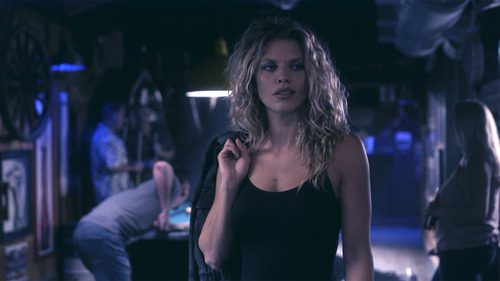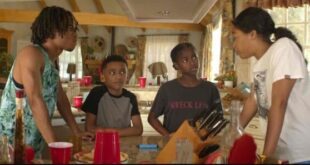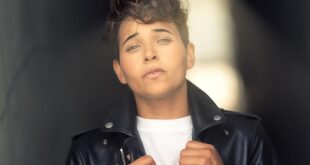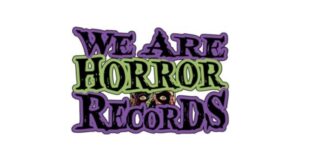Note: This piece was written during the 2023 WGA and SGA-AFTRA strikes. Without the labor of the writers and actors currently on strike, Condition of Return being covered here wouldn’t exist. Condition of Return was approved for an Interim Agreement with SAG-AFTRA.
What a lot of people don’t know about me is that I grew up Catholic. Growing up Catholic means Bibles, going to church, priests, God, and Catholic school from kindergarten all the way through senior year. There are several reasons why I no longer take part in any religion, and some of those things are part of AnnaLynne McCord’s new movie, Condition of Return. The movie, written by John Spare and directed by Tommy Stovall, just reminds me why I walked away.
Shackled in a police station breakroom after committing a heinous crime, churchgoing schoolteacher Eve Sullivan is questioned by psychoanalyst Dr. Donald Thomas, who is tasked with determining her fitness to stand trial.
If you know anything about me, then you know how much I love the film Excision (2012), Ricky Bates Jr’s bloody and brazen masterpiece starring AnnaLynne, so when the offer to interview her came up, I jumped on it and didn’t let go. We chatted via Zoom about why she wanted to do this film, her character Eve, Anthony Hopkins, and more!
Trigger Warning: SA
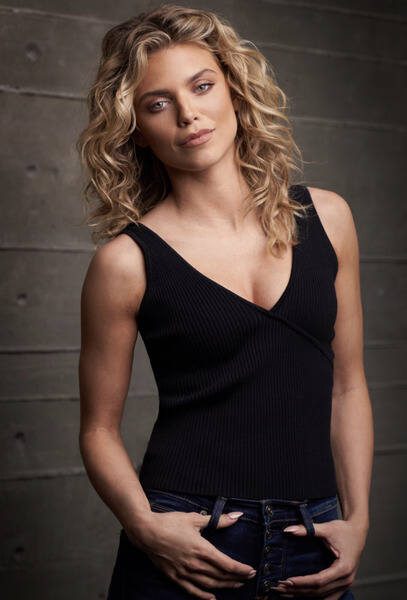
PopHorror: AnnaLynne, thank you so much for your time. Condition of Return was really intense, and I really enjoyed it. I’m a huge fan. Excision is one of my top five favorite films, so I’m super excited to speak with you.
AnnaLynne McCord: Thank you. I’m happy to be here with you too.
PopHorror: So, what intrigued you about the script for Condition of Return and made you want to be a part of the project?
AnnaLynne McCord: The fact that I didn’t want to do it. Right off the bat, I read the first page, and I was like, no. And I’m not… you’ve seen my work. I don’t shy away from gnarly material. This was all too relevant. And I immediately felt this whole just tightening and no and awkward and discomfort in my body. And I called my agent, and I was like, “Yeah, tell them I’m going to do the film.” And they were like, “Okay, do you want to finish reading the script?” I was like, “Nope, I’m going to do the film.” Because I knew that I needed to do it. I needed to answer the question of why my body got so uncomfortable and why I was in such resistance to playing this role when I don’t shy away from characters who do all kinds of things and might not even bat an eyelash about it, right?
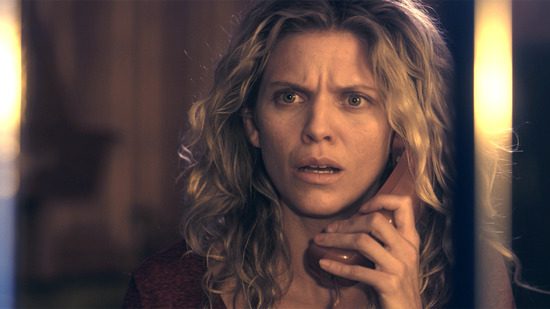
They are in a world that feels fantastical, feels maybe not so possible, certainly not so relevant. And this was different, because this is happening all the time. According to the statistics, it’s happening next to twice a day. It’s happening 600-plus times a year in the United States, and I needed to know why I was resistant to being a part of something that could have a broader message. And once I brought that in, that actually made it make more sense. I was like, yes, remember why I can do, what I can do with this. And that became a bigger why. But also, the film has a lot more going on. And I’ve had an interesting relationship with religion. I’ll just say that. And I found it very important, the way this film addresses the issue of toxic theology in our world. I talk a lot about my mental health journey.
I talk a lot about what caused me all the mental health concerns, one being sexual abuse as a child by a pastor of a church. So for me, the weight of what that did to me, to have someone in a position of authority who’s supposed to come from this shepherding, compassionate, peaceful, truthful, authentic space, and instead, they’re waiting to tap in to a moment of your vulnerability and turn that on you and use it against you and then say, “I speak on behalf of a higher power,” or whatever is their way of manipulating that narrative.
I had serious religious trauma, as one can imagine, and I look at corporations and organizations and can you imagine if we let corporations and organizations and companies that knowingly have pedophiles in their ranks for decades, for decades and decades, knowingly abuse children, knowingly sexually abuse individuals within their business, or like I said, corporation or organization, and we just are like, we’re not going to tax them. They’ve got some bad apples. I think about Chris Rock and he’s like, “There’s some professions where you can’t have bad apples.” American Airlines can’t say, “Some of our pilots are just bad apples.” Right?
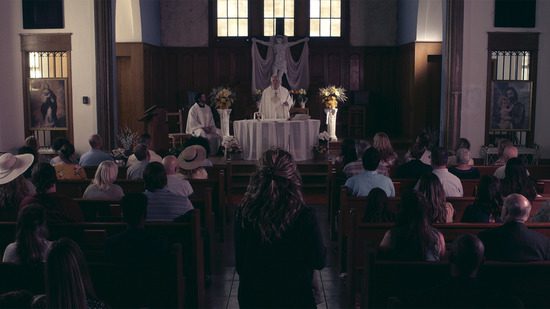
You can’t have that. And when you are representing something that people look to in their darkest hour, when they’re the most vulnerable and the most open, and you have individuals who exploit that? You’re talking about a level – and I don’t use this word very often – but I would say this is what broaches on evil in our world. Certainly toxicity, certainly toxic. And I think that the conditioning and the programming gets us to this place where we give over our sovereignty when we’re in a state of blind faith. That is not to be confused with someone who has a wonderful spiritual practice that makes them more compassionate and peaceful and wonderful. And I love that, and I believe in a higher power, and that is all to say that I honor and respect the sacred, right? What I do not have time for is anything that invites or demands or requires or suggests obedience, which I feel is slavery.
So it’s enslavement of the mind. And so you see my character Eve go on this journey, and everything that comes out of her mouth is just regurgitated concepts, lacking human discernment, lacking any sense of insider intuition or introspection in the sense of what we have within our own selves. And if you believe in the Bible, and since I was raised in that regard, I can quote it, you’re made in the image of a higher power. You’re made in the image of God, according to the Bible, right? If that’s the case, why are we second guessing ourselves all the time? Why are we unworthy? God’s so perfect and wonderful, but he screwed up the image of Himself, and so we’re unworthy and imperfect? And that narrative has always confused me. If He’s an all perfect God and we’re made in the image of Him and we’re imperfect, did y’all miss the memo?
Have you ever seen how a copy machine works? It takes the image exactly as it is and copies it. So there’s this belief inside of Eve that she’s unworthy and she’s gross and she’s undeserving. And you just see her attract what that brings to you when you believe that. And just one thing after another hits her life and you ask yourself, and at least for me, playing the character, I ask myself, what happens to me? What does AnnaLynne do if she has the feds show up in her front yard and accuse her of things that, in my life, working is very personal, I can’t fathom that accusation. But even just as an individual, these are really heavy things. And I think the writer, John really made a point to use entertainment for what it’s for. We can suspend disbelief, to put all those things in her life all at once to make the audience, maybe not make them, but invite the audience to ask themselves what would you do?
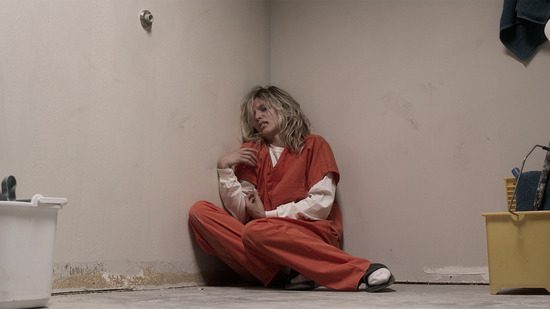
How good could you stay and for how long, if hit after hit, after hit, after hit happens in your life, one right on top of the other, and it’s injustice after injustice? It’s not even like you did anything to ask for it. And so there’s that aspect. And then there’s the aspect of her belief around being a 20-something little girl and having fun at a bar with a boy, and suddenly she’s shaming herself for the rest of her life because her hormones were raging? These are archaic thought systems that should be eradicated from our world. And so I feel like the film really touches on so many relevant topics, along with the unfortunately relevant issue of mass shootings.
PopHorror: Yes, I agree. And I grew up Catholic, and there’s a reason why I am no longer. So I feel that. And talking about your past, I read an amazing article about you today. It was part interviews, so I’m glad that you brought that up, because I was wondering if this role was cathartic for you in any capacity?
AnnaLynne McCord: The catharsis came after the confrontational aspect. I was like, my blood pressure’s getting high up in here. I was like, AnnaLynne, channel the energy into the character, calm thyself. It was intense, but there was some catharsis, and it came from the conversations that I had on set. I loved my onset costumer and I loved the conversations that she and I would have. She goes to church, she has a faith that she likes to believe in, and it makes her life better. And we could talk from two different points of view on certain things. And she was using it for all the reasons that it’s supposed to be there and nothing else. It made her kind, it made her compassionate, it made her empathic, it made her beautiful. I think one of the reasons that I needed to do this film, and I do think that I needed to do it, because normally the things we don’t want to do have some kind of need in there that we need to look at.
So my resistance to this film and my need for it was I actually was judging people who are Eve, in my personal life. Like how can you believe in that shit? All agro. And I was actually not judging anybody but me, because I felt snowed by my childhood. I fully believed in everything that I was taught about the Christian faith. And I felt like I was lied to when this pastor was sexually abusing me and using God to say that children should obey adults and all of these things. There was a part of me that had a healing release from this film, because I had to not judge Eve if I was going to truthfully play her. And in the moments when I felt judgmental towards her, I had to quickly eradicate that from my body, from myself, from my mind, so that before I went on set and on camera, I was actually able to truthfully and authentically be her.
And there were moments where I felt icky. Like when she would just do the repetitive praying, I was like, oh, I’m feeling uncomfortable. And it was because I used to pray like that, that this abuse would stop. And I felt forgotten, and I felt unseen, and I felt left out, and I felt like God didn’t care about the children the way He said He did in the Bible. And I had to face a lot of that through the making of this project.
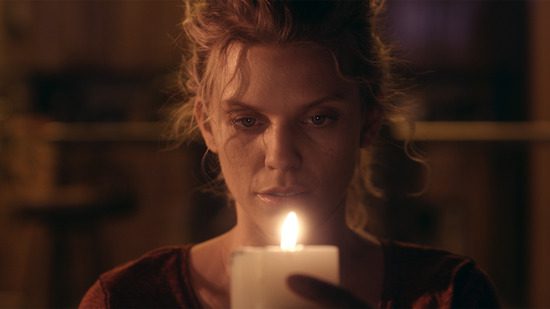
So I think there’s a relevant aspect to a lot of people, because I talked to a lot of people after having done this film. I’ve spoken to a lot of people, but I’ve talked about this thing for a long time, and whenever this conversation goes this way, most people have a story that ain’t great about the church. And so I’m really grateful that I’m done filming it. But I’m grateful for the journey that it took me on, because it was a tricky one. It wasn’t fun, and I’m always up for a challenge, and because it was so challenging, I feel like I went to another level of myself as a result.
PopHorror: I’m really glad that you decided to do it. I think it was a perfect role for you. And you mentioned that you’re no stranger to the gnarly roles, and Eve is… You really embrace your roles is what I want to say. You really immerse yourself. Was there anything that you were adamant about bringing to Eve?
AnnaLynne McCord: It was honestly the things that I judged the most that I fought with in myself, came to terms with, and then was able to go to set with. And then I would be her advocate. I was like, okay, so what we need to do is exactly what I didn’t think I could ever allow her to do because I was so mad at her for. But the main thing that I really wanted to showcase was what does a person look like when they’re inside a prison of their own making or inside a prison that they don’t know they’re in? What does that look like? It looks like innocence. How do you play a mass shooter who’s innocent? It’s actually a complete oxymoron.
She believes so strongly with her blind faith, that she gave over her sovereignty to such a level that it was almost as if it eradicated her awareness of the level of what she was doing. And this was the most important thing to me, because this is how people justify wrong actions in our world every single day, all day long, including the person who was sexually abusing me for years. Somewhere in his mind, he did not think he was doing something bad. He found a way to justify within the prison of his own mind what he was doing to make himself entirely innocent. And that is very uncomfortable to think about.
PopHorror: Oh, absolutely.
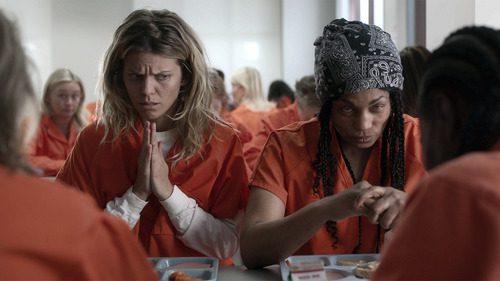
AnnaLynne McCord: But that’s the reality that we live in. People do not think they’re bad. And it’s not about whether or not they’re bad or good. I think we’re not bad or good. We’re both, right? But when you’re making wrong decisions, you’re not like, “Okay, it’s Tuesday, time for another wrong decision!” That’s not it. It’s little tiny choices, fracturing and fragmenting the self, until you’ve completely disavowed yourself from who you truly are, from your consciousness, from your soul, from your spirit, from that essence of who you are in your true, authentic self, and you’ve become something altogether different.
And it’s not fun. It doesn’t feel good. Happy people don’t hurt people. So for me, Eve needed a level of innocence. She needed to believe that she could have forgiveness, that she could get back to that. And so it’s not like in her mind she thought that she didn’t do something wrong. It’s in her energy. It’s like, “No, no, no. If I just pray enough, God will forgive me, and I’ll go to heaven. I will. I will. I know, because that’s what they told me. That’s what they told me.” And so, she needed enough of that for me to believe that she would choose to do the act that she did in that church with all of her congregation. They were her own congregation.
PopHorror: Thank you for your personal answers. I really appreciate you opening up. I know it’s not easy to talk about. I have just one last question for you today. I promise it’s not a heavy one. What is your favorite scary movie?
AnnaLynne McCord: Oh, that’s a very good question. I always go back to the OG. I always go back to the Lord Almighty, Anthony Hopkins. Sir Anthony Hopkins. There is just no one who plays a character that’s supposed to be villainous like Sir Anthony Hopkins, and it’s Silence of the Lambs. It’s Silence of the Lambs all the way. Just talk about making you uncomfortable. That’s what this is. And I always think about Carl Jung, and he talks about how you cannot have branches that reach into heaven if you don’t have roots that reach into hell.
And that’s what these films are, an opportunity for us to kind of see symbolism on, right? It’s the shadow part of ourselves, the icky, yucky. We’re fascinated watching it on screen, because we certainly don’t want to look at it in the mirror. So I love him, and I think Fracture that Anthony Hopkins was also in, and he played another quiet, villainous, but you love him. You’re so upset when the police get him. It’s in a cabin in the woods and it’s like this neighborhood, and it’s something with his wife. I don’t even remember. I don’t remember any of the story. I just remember him, and I remember I was so mad that they got him. He was going to get away with it. And I’m over here rooting for him to get away with it. And I’m like, oh my gosh, what’s happening? But we’re so unkind to that shadow part of ourselves, and it’s the shadow part of myself that’s the reason that I’m still alive because she protected me from my abusers. She protected me from the worst abuser I’ve ever had, which was me, because I took all the abuses perpetrated onto me, and then I compounded them and exacerbated them within my own mind for decades. And I kept doing it to myself, and I kept harming myself – emotionally, mentally, and physically – and it was my shadow self that said, “I’ve had enough.” And so I think there’s a part of us that would do well to not just watch us on the movies and then go home, but to actually look in the mirror and realize that sometimes our shadow integrated with our light is a much better option than pretending like it doesn’t exist.
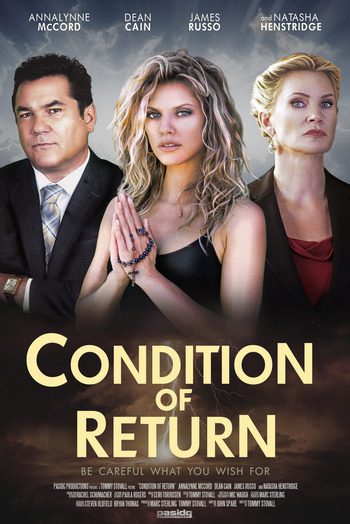
Thank you so much to AnnaLynne for taking the time to speak with us. Condition of Return is out now.
 PopHorror Let's Get Scared
PopHorror Let's Get Scared
